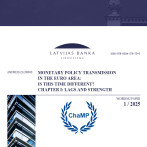Money supply slightly down
Despite the persisting stability of the financial markets and continued rapid growth in the export-related industries, the rising inflation, particularly under the influence of the leap of fuel and electrical energy prices and increased tax burden, has an increasingly pronounced effect on domestic demand. Parallel to that, a drop in deposits or stagnation has been observed for some months. Both lats and foreign currency deposits were down in April. Thus for a second consecutive month the overall money supply has also dropped in April. Because of the end-of-April – beginning-of-May holidays, a higher demand for cash currency was observed at the turn of the month. The total loan portfolio of banks continued to drop at a practically steady rate.
Money indicator M3, which characterizes the amount of cash and non-cash currency in the economy decreased in April by 0.9%, with the M3 annual growth rate dropping to 4.3%. The annual growth rate dropped also for bank-attracted deposits (to 1.7%) and cash currency in circulation (to 14.2%). The M3 decrease was determined by a substantial drop in term deposits and deposits redeemable at notice, with the balance of overnight deposits slightly up. Enterprise deposits dropped substantially in April, whereas the drop in household term deposits was balanced by a rise in funds in their settlement accounts.
The domestic loan balance dropped in April by 0.9%, and the rate of annual drop in loans reached 9%. The drop in total loan balance took place on account of the drop in loans in euro. The low interest rates on lats loans and expectations of a rise in euro interest rates promoted a slight rise in lats loan balance. Lending in other foreign currencies was also slightly up.
In the coming months, money supply will probably be affected by the low domestic demand, whereas a positive influence on the funds in circulation will be exerted by growth in the export-related industries promoted by the good export results. Additional risks, however, are created by the unstable external environment, which, in the case of less beneficial development could limit the growth in exports. The lack of certainty about the future not only has a diminishing effect on household consumption but also keeps entrepreneurs from investing. Any recovery of lending is therefore not likely in the near future because the hitherto observed unwillingness of banks to lend is increasingly turning into an unwillingness of enterprises and households to borrow. The adoption of clear fiscal policy decisions relating to the cutting of next year's budget deficit would preclude speculations about further tax hikes and would foster resumed confidence in the economic policies of the state, thus gradually stimulating domestic demand.
Textual error
«… …»






